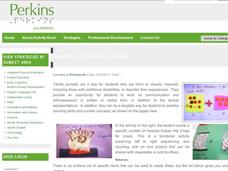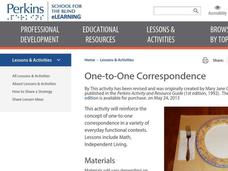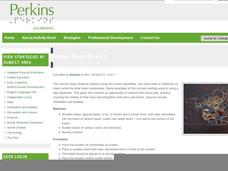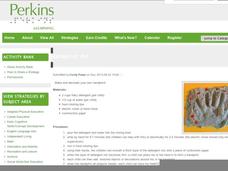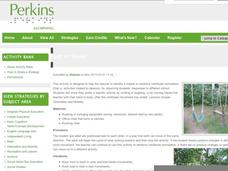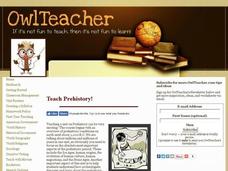Perkins School for the Blind
Build a Word
Get out those scrabble tiles and a braille tape labeler because today we are playing a build-a-word game! Label several sets of scrabble tiles using the braille labeler, place them in a box, and have children take turns pulling letter...
Curated OER
Making a desk organizer for students who are blind or visually impaired
Organization is of the utmost importance when teaching orientation and mobility to learners with visual impairments. To help keep everything in order and provide independence, use these instructions for making a desk organizer. The...
Perkins School for the Blind
Wheel of Fortune Game
Games are great for practicing any number of basic skills. Here is a set of wonderful instructions for making a braille version of a spinning game, where children win points by correctly reading/identifying the high-frequency words the...
Perkins School for the Blind
Kitchen Clean-up
If you make a meal, you must clean up the mess. Foster a sense of independence while having learners practice a skill they can use in the workplace. Teens with visual impairments practice cleaning, organizing, stacking, and sorting a...
Perkins School for the Blind
Coin Identification
You got some money, and you're not afraid to use it. Before you can use that money, you need to know what it's worth. Included is a set of activity instructions that will help your visually impaired learners indentify coins. Pupils are...
Perkins School for the Blind
Planning a Special Event
I love planning parties, they are a great way to get social, require organizational skills, and engage cooperative problem solving. Teens with visual impairments put their heads together to plan an event for their friends. They choose an...
Perkins School for the Blind
Counting in Tactile Journals
This is one of those great ideas I totally love. Youngsters with visual impairments practice counting and left-to -right sequencing by counting out a set number of edible objects from the left and putting them in a bag on the right. They...
Perkins School for the Blind
Eating Out
Going out to lunch, reading a menu, making choices, and spending time socializing are all parts of growing up. Teens with visual impairments use several braille menus from local restaurants to practice ordering and appropriatelyeating...
Perkins School for the Blind
One-to-One Correspondence
Here is an interesting way to build concept understanding regarding one-to-one correspondence. Learners with visual impairments will use an array of everyday objects in context to foster an understanding of what one-to-one correspondence...
Perkins School for the Blind
Rubber Band Stretch
If you don't teach blind or visually impaired students, this lesson may seem a bit strange. But, it helps them develop motor skills, orientation and movement skills, and listening skills, while building a better understanding of...
Perkins School for the Blind
Balance Stations
Children with visual impairments need to continuously work on balance, gross motor skills, and mobility. Foster mobility and orientation skills by engaging them in a series of fun balance stations during PE. You'll set up each of the...
Perkins School for the Blind
Handprint Art
Stimulate the senses with a handprint art project! Flake laundry detergent, water, and food coloring are mixed together to create a substance that has a pleasant smell and will dry hard and dimensional. Children with visual disabilities...
Perkins School for the Blind
Adapted Sorry Board Game
Board games are great for building social skills and for fostering recreation and leisure skills! Here, you'll find an image and a brief description of how you can make a tactile version of the game Sorry for your blind or low-vision...
Curated OER
Fast or Slow?
Vestibular stimulation is an action or activity relating to balance and motion. To find out what kind of vestibular stimulation your learners with multiple disabilities enjoy best, follow these simple suggestions. You engage the child in...
Owl Teacher
Teach Prehistory!
Are you wondering how on Earth you're going to teach prehistory to your class? Don't worry, you'll find everything you need to conduct a unit study on the Ice Age, human origins, and the evolution of human culture. Included is a list of...
Perkins School for the Blind
Baseball
Baseball is an American pastime, super fun to play, and can be made accessible to learners with visual impairments. Instead of taking to the ball field, your class can learn the rules of the game by playing a small three-dimensional...
Perkins School for the Blind
Building a Basic Series Circuit
Make science a fully accessible subject for your learners with visual impairments. They'll use tactile models to explore the nature of basic electrical circuits. Template board, wires, batteries, and Velcro are used to construct the...
Perkins School for the Blind
Conductors of Heat - Hot Spoons
Why is the end of a spoon hot when it's not all the way in the hot water? A great question deserves a great answer, and learners with visual impairments will use their auditory and tactile senses to get that answer. A talking...
Perkins School for the Blind
Conservation of Mass
How do you teach a student with visual impairments about the conservation of mass? You use tactile models that represent the theoretical concept. Baking soda and vinegar are used to add gas to a deflated balloon. Learners will feel the...
Perkins School for the Blind
Polyatomic Ion Bingo
If your class is learning about polyatomic ions and needs a fun way to study those chemicals, then a bingo game might be right up your alley. This bingo game is intended to boost memorization skills, specifically the names of tricky...
Perkins School for the Blind
Mixtures and Solutions
Mixtures and solutions are different; one can be separated fairly easily and the other cannot. This hands-on experiment was written specifically for learners with visual impairments or blindness. They will use lemonade and trail mix to...
Perkins School for the Blind
The Three Basic States (Phases) of Matter
There are three basic states of matter: Solid, liquid, and gas. Help your learners with visual impairments to understand the chemical nature of each state of matter with tactile elements. Marbles are used to model the particles in each...
Perkins School for the Blind
The Mystery Box - Making Observations and Collecting Data
Making observations and collecting qualitative and quantitative data is a vital skill all scientists need to practice. Help your scientists with partial and no sight learn how to use their other senses to make observations for...
Perkins School for the Blind
Volume, Mass, and Density Boxes
Mass and density are difficult topics for kids to understand, and even more difficult when you have visual impairments or blindness. Learners will make boxes and fill them with cotton, sand, or crushed paper. They will feel the density...
Other popular searches
- Class Newsletter
- Bill of Rights Newsletter
- Creating a Newsletter
- Newsletter Template
- Classroom Newsletters
- Autobiographies Newsletter
- Creating Newsletter
- Newsletter Writing
- Writing a Family Newsletter
- Back to School Newsletters
- Newsletter on Computer
- Student Newsletters








